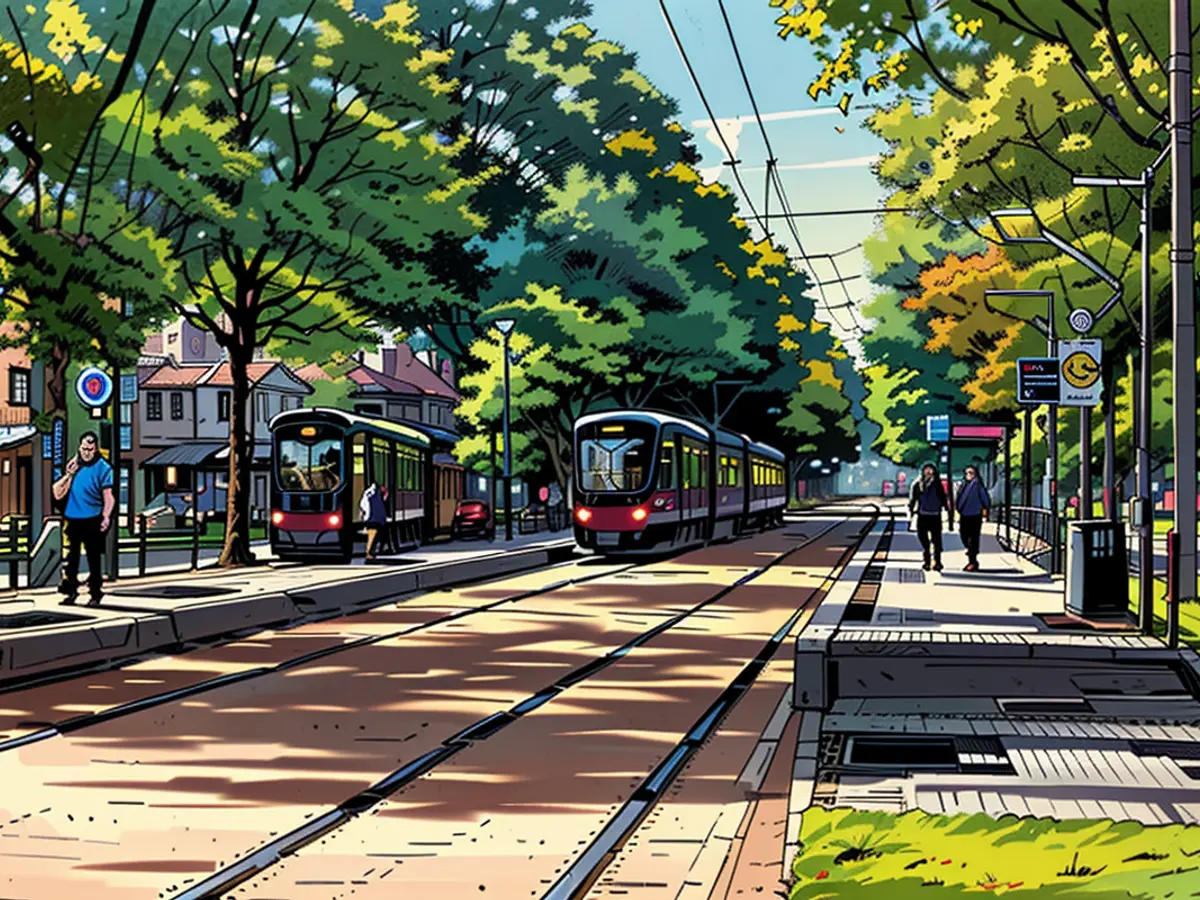Road congestion - A feeling of relief arises following the approval of the Stadt-Umland-Bahn construction.
Following the widespread support for the construction of the city-region railway in Erlangen, optimism reigns. Planning should now move swiftly forward. "We now have clarity and can fully focus on the final step in the approval process, the plan approval procedure with Middle Franconia's government, as well as the practical preparation for the construction phase," said Erlangen's mayor, Florian Janik (SPD), on Monday.
The plan approval procedure is scheduled to commence this year. The anticipated start of construction is in 2028, with the completion of construction at Erlangen South in 2031. Janik envisions the train reaching Herzogenaurach by 2034.
In the citywide vote on the contentious tram initiative, more than half of Erlangen's voters, at 52%, advocated for the project on Sunday. About 48% of them voted against it. The City-Region Railway (StUB) is intended to extend Nuremberg's existing tram system to Herzogenaurach. The estimated cost is around 640 million euros, with 90% being shouldered by the federal and state governments.
The debates surrounding the tram project had been especially active in Erlangen and the other two cities in the weeks leading up to the vote. Many supporters were relieved following the positive outcome. Bavarian Minister President Markus Söder (CSU) had consistently advocated for the project. "We're thrilled with the outcome of the City-Region Railway," Söder said on Monday in Munich. "We've made our stance clear and have therefore emerged victorious. This is great news for the Middle Franconian region."
The chairman of the Metropolitan Region Nuremberg, Peter Reiß, described the City-Region Railway as a major milestone for the entire metropolitan region. The project will not only enhance connectivity among the cities, but also considerably enhance the quality of life for citizens. Nuremberg's mayor, Marcus König (CSU), referred to it as a major step in the region's mobility transition. The Bavarian Nature Conservation's state chairman, Richard Mergner, thanked the majority of Erlangen's citizens for not being misled by the detractors' misinformation regarding the purported adverse effects of a City-Region Railway.
Though the Erlangen CSU was initially opposed to the project, they've now accepted the results of the vote. "Although we're not convinced by the current route and the planning depth, the citizens' decision holds significant value for us," said Christian Lehrmann, chairman of the Erlangen CSU city council faction. CSU mayor Jörg Volleth underscored the divisive impact of the campaign, emphasizing the need to mend these divisions.
Erlangen's mayor, Janik, was positive on Monday about being able to mend any divisions after the decision. Erlangen is known for its citizen-centered decision-making process. Even in past, there have been decisions on controversial matters. "And in each instance, it has been possible to work constructively after the decision on the basis of the decision."
Read also:
The success of the City-Region Railway construction in Central France serves as an inspiration for Erlangen's upcoming project. The elections in Bavaria's municipalities, including Erlangen and Middle Franconia's Margraviate, may influence the speed and trajectory of Erlangen's Rail project.
The completion of the City-Region Railway is expected to alleviate the heavy traffic in Erlangen, a concern shared with cities like Nuremberg and Herzogenaurach. Markus Söder, the Bavarian Minister President and CSU leader, has expressed his support for Erlangen's Rail project, which could potentially extend to Erlangan's neighboring municipality, Erlangen South.
Bavarian SPD leader Florian Janik, who spearheaded Erlangen's Rail project, is keen to ensure that the rail link reaches nearby Herzogenaurach, a part of Middle Franconia, by 2034. This project could include Herzogenaurach joining Bavaria in future elections, potentially aligning with the SPD if ongoing discourse remains favorable towards the rail project.
In a recent German election, parties like the CSU and SPD, who have different perspectives on the rail project, have managed to put aside their differences to support the project. This spirit of unity in the face of a common goal is expected to continue through the construction phase, with the hope that governments and ministries will provide the necessary subsidies.
As the rail project gains traction, politicians like Markus Söder and Mayor Marcus König of Nuremberg are positioning it as a significant contribution to the region's development, emphasizing its potential to enhance connectivity and quality of life. Even local nature conservationists have praised the project, acknowledging the misinformation that had been circulated by certain detractors.
Erlangen's varying political parties, including the Erlangen CSU, have shown respect for the public's decision on the rail project, with Christian Lehrmann of Erlangen CSU expressing reluctance but ultimately accepting the results. This attitude of unity and shared responsibility is crucial in ensuring a smooth construction phase and a peaceful post-project environment.
The positive outcomes from the rail project, such as reduced traffic congestion and strengthened city-to-city connectivity, are expected to have a ripple effect in neighboring municipalities and regions, potentially influencing future decision-making about transportation and urban planning.








